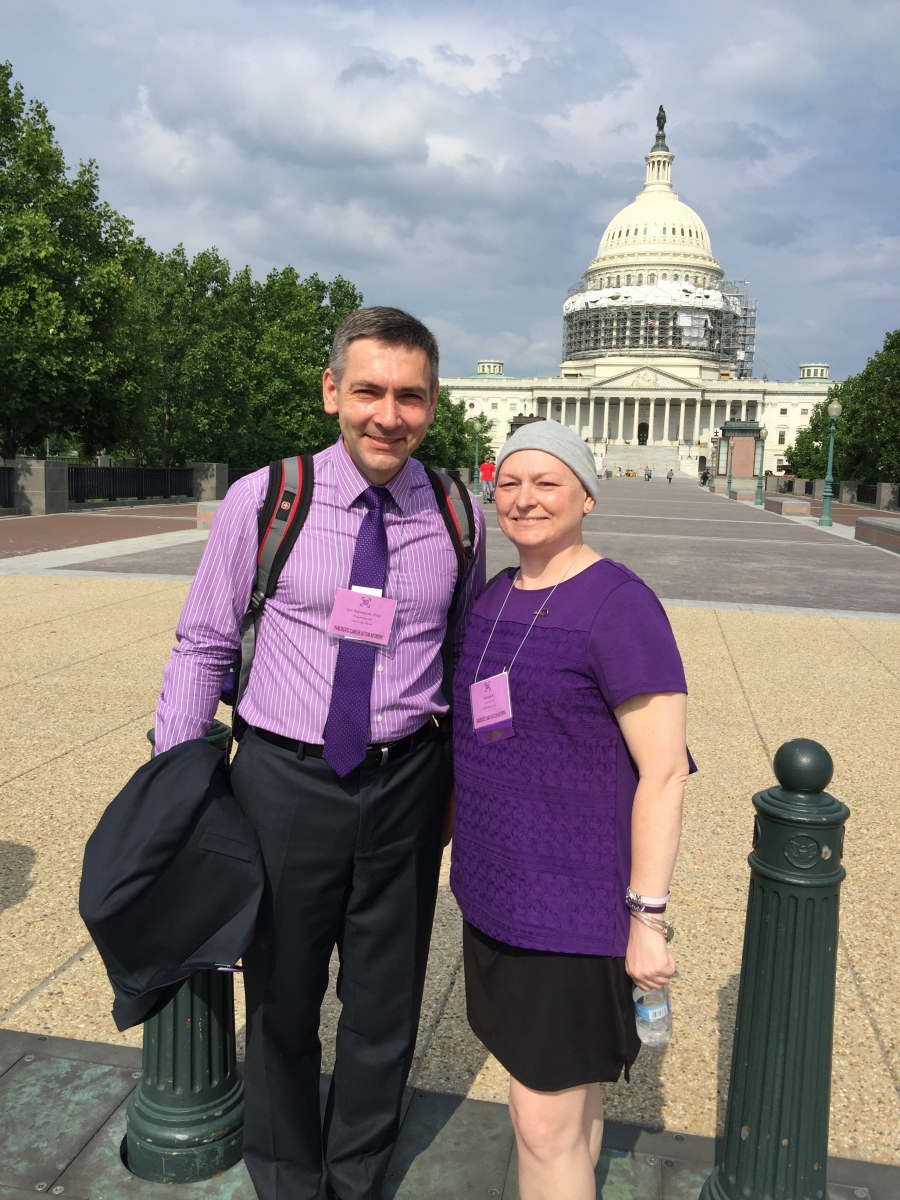
Igor Astsaturov, MD, PhD, and Patient Melissa Kartasevich Attend Advocacy Day 2016 to Advocate for Funding for Pancreatic Cancer
-
In a report of the top five deadliest cancers, pancreatic cancer is listed as No. 3, and it has the lowest survival rate, at 8 percent, among those cancers. With these statistics, it is surprising that in 2013, the National Cancer Institute (NCI) allocated only $101 million to pancreatic cancer research — the second-lowest funding of the five deadliest cancers. In response, the Pancreatic Cancer Action Network organized Advocacy Day as a way to advocate for more federal funding and initiatives for pancreatic cancer.
A photograph of Igor Astsaturov, MD, PhD, and patient Melissa Kartasevich, standing outside the White House. Igor Astsaturov, MD, PhD, a medical oncologist at Fox Chase Cancer Center, and his patient, Melissa Kartasevich, were among 700 people present at Advocacy Day 2016. Patients, caregivers, doctors, and other medical professionals gathered in Washington, D.C., for the three-day event.
“There were several sessions during the day you could choose from,” said Kartasevich. “Since it was my first time, I chose a class in the morning called, ‘How to Tell Your Story.’ In the afternoon, I attended ‘A Day in the Life of a Researcher,’ taught by Dr. Igor.”
After the training sessions, attendees were broken into groups by state and were assigned to meetings with various senators and representatives. Kartasevich and Astsaturov were among 40 participants from Pennsylvania. They met with Sens. Robert Casey and Pat Toomey and Reps. Brendan Boyle and Michael Fitzpatrick.
During the meetings, Kartasevich and Astsaturov advocated for increased funding from the National Institutes of Health and NCI, support for the Moonshot Initiative, and a commitment to sign a letter to the House Appropriations Committee in support, once again, for including pancreatic cancer in the Department of Defense’s Peer-Reviewed Cancer Research Program.
The entire event, devoted to advocating for increased funding and awareness, was not only effective, but motivational for those in attendance. “It was a very empowering, very positive experience,” Kartasevich said. “Some people who were there had been there since the beginning —eight years. It’s their life. They do anything they can to create awareness. It motivates me to be even more of an advocate.”
Astsaturov is among those dedicated to the event, as he has been involved since the beginning. For him, each opportunity to speak up is important, no matter one’s position or scope of influence. “If you keep quiet and don’t say anything, nothing will change,” said Astsaturov. “If you have a concern, you bring it up. Your voice is heard through public forums — it’s the basic tenet of democracy.”
Funding for all cancers, especially the deadliest cancers, is critical to saving lives. Pancreatic cancer is so deadly because it commonly goes undiagnosed until the cancer is in an advanced stage — partly due to its location in the body and partly due to the lack of symptoms. This issue of late diagnosis combined with a lack of therapies and no effective drugs, other than chemotherapies, makes pancreatic cancer a perfect candidate for increased funding and awareness.
Increased funding will help researchers and clinicians, like Astsaturov, conduct more clinical trials to better understand this cancer and create effective therapies to destroy cancer cells. It will help patients, like Kartasevich, enroll in those clinical trials and receive new drugs and therapies, with the hope of eradicating the cancer completely.
For Kartasevich and Astsaturov, Advocacy Day 2016 means hope for the future. “[The patients who attend the event are] at war; they’re fighting for their lives,” Astsaturov said. "These patients are the most courageous, generous people — helping themselves and helping other sufferers. Despite their sickness, they come out. They are so strong spiritually and mentally. For me, being there next to patients and families is an inspiring moment.”
